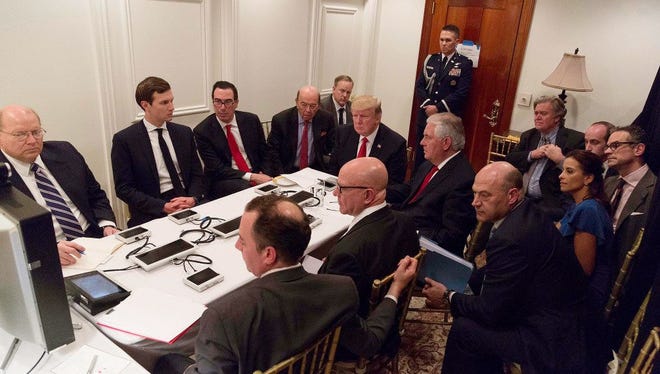We're lucky Trump is clueless about foreign policy: Robert Robb
The world is too messy for grand philosophies and goals, as Bush and Obama found out.
Any semblance of a Donald Trump foreign policy construct coming out of the presidential campaign evaporated with the retaliatory cruise missile attack on a Syrian airbase.

Trump is going to conduct an ad hoc foreign policy, unrooted in any overarching strategic vision of America’s place and role in the world. That may be OK.
During the campaign, Trump displayed instincts about foreign policy that could be cobbled together into a construct.
Trump made it clear he thought the United States was overextended globally and too quick to get into fights in which there wasn’t truly an actionable national security interest at stake. And that the United States did too much and our allies did too little in maintaining international order.
That suggested that Trump would conduct a hard-headed national-interest foreign policy. The Trump administration would advance American interests, narrowly defined. It would seek and work with allies to that end. But otherwise, other countries needed to step up to the plate.
Trump claimed that there was an actionable national security interest in retaliating against Bashar Assad’s use of chemical weapons. But that was just gloss.
The attack on the Syrian airbase didn’t make the United States any less likely to be the target of a chemical attack.
There can be no doubt that the United States would retaliate massively against any use of chemical weapons against us. A retaliatory gesture against Assad wasn’t necessary to reinforce that point.
Trump's flip-flops don't make him a statesman: Gabriel Schoenfeld
Why Trump may be about to decapitate North Korea: James Robbins
Instead, this was a military intervention purely on humanitarian grounds. It is intended to deter Assad from using chemical weapons against Syrians, even though that doesn’t advance a hard-headed, narrowly-defined American interest.
Nor is the attack part of a larger strategy for Syria, the Middle East, or American relations with Assad’s enablers, Russia and Iran.
It arguably had the ancillary benefit of causing other countries to recalculate the willingness of the United States to use force under Trump compared to Barack Obama. But that didn’t drive the decision. The decision was driven by the desire to deter Assad from using chemical weapons, period.
It was a completely ad hoc decision. It felt like the right thing to do. So Trump did it. And most Americans seem to agree that it was the right thing to do.
My guess is that’s the way foreign policy is going to be conducted under Trump, a series of ad hoc decisions based on what seems right or doable at the time. At the end of the day, to borrow from Winston Churchill, there will be no theme to the pudding.
Trump follows two big construct presidents when it comes to foreign policy.
After 9/11, George W. Bush saw the United States as a catalyst for transforming authoritarian states in the Middle East into market-oriented democracies.
The wars in Afghanistan and Iraq weren’t just to chase out perceived threats. Both countries were to become exemplars for the region and a contagion for change within it.
Obama’s big construct wasn’t, as neoconservatives would have it, just to retreat from global leadership and responsibility. Obama’s construct was considerably more subtle than that.
POLICING THE USA: A look at race, justice, media
The suprising truth about Trump and veterans: Column
Obama wanted to reset America’s relationship with the world to be more cooperative and respectful. The United States would continue to provide leadership. But it would operate in coordination with others, through multilateral organizations. That would result, according to Obama, in a more secure international order and greater burden sharing by other countries.
It’s fair to describe both of these big foreign policy constructs as failures.
The democratic tide in the world is receding, not advancing. Afghanistan and Iraq are messes, examples of American overreach, not exemplars of good governance or the virtues of democratic capitalism. The threat of terrorism can’t be quantified, but it doesn’t seem to be abating.
Things fell apart everywhere under Obama. Cooperative multilateralism is no match for national interest realpolitik, which still governs the affairs of nation-states.
The world is a messy place. There is no clear path to navigating the Sunni-Shiite competition for regional influence in the Middle East, containing Russian revanchism, coping with the rise of China, eliminating North Korea’s nuclear threat, or controlling Islamic terrorism. There’s no big construct that envelops all of this, and more.
Picking our way through it ad hoc may be the way to go.
Robert Robb is a columnist for The Arizona Republic, where this piece was first published.
You can read diverse opinions from our Board of Contributors and other writers on the Opinion front page, on Twitter @USATOpinion and in our daily Opinion newsletter. To submit a letter, comment or column, check our submission guidelines.